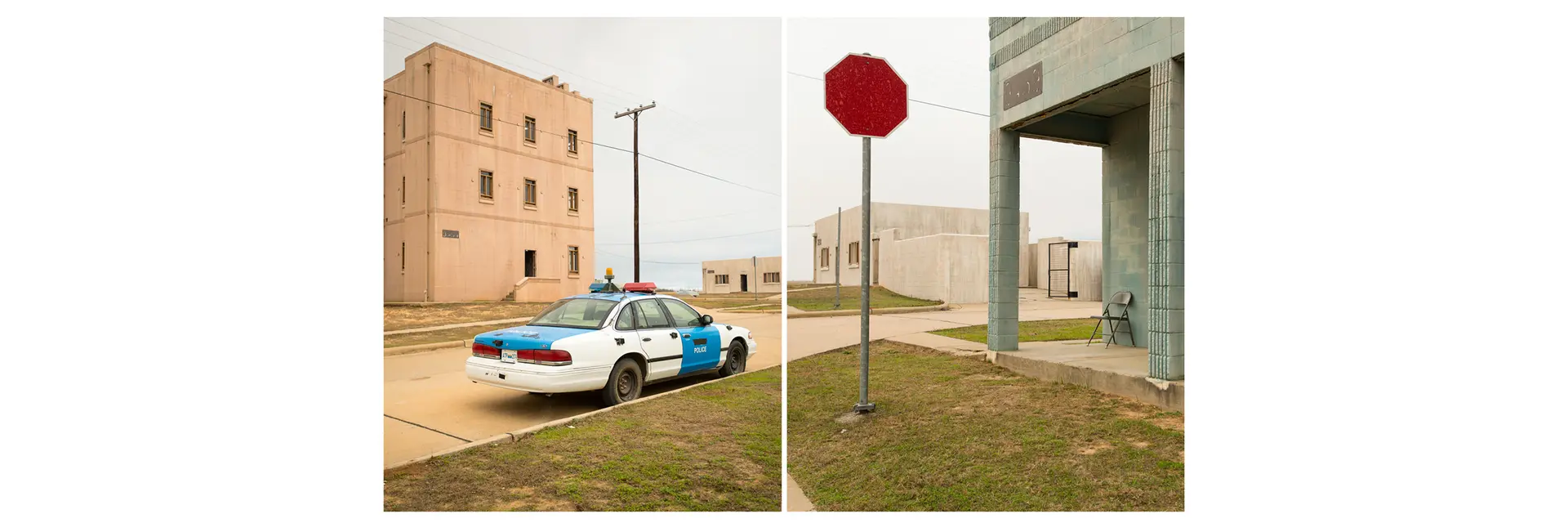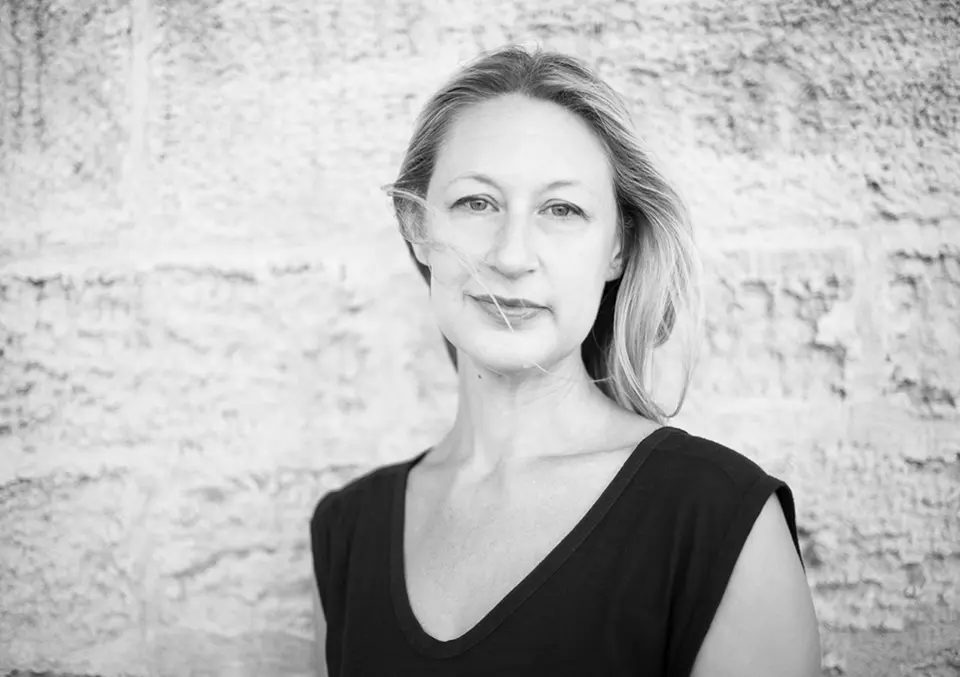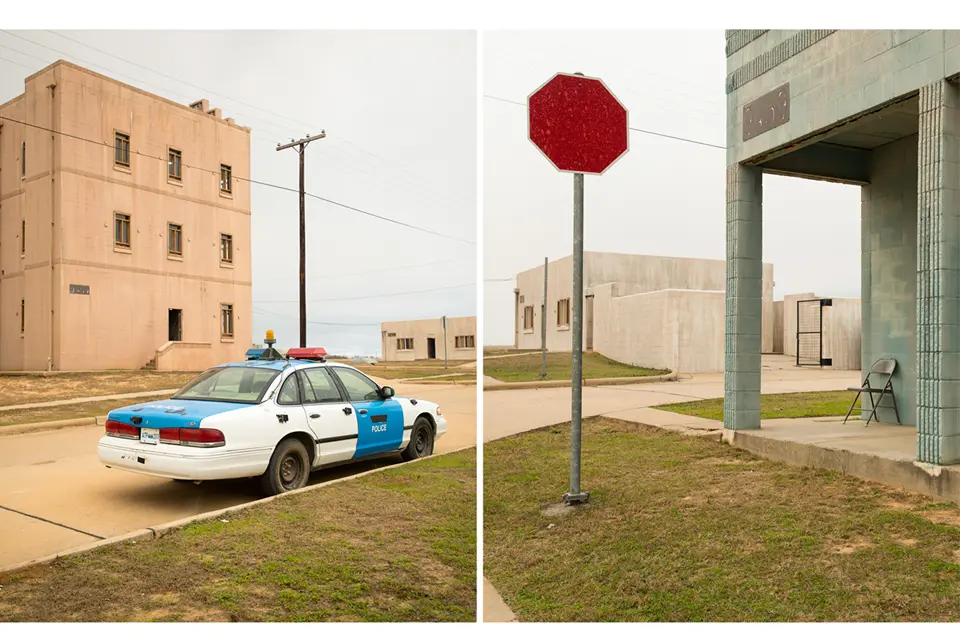
Her Legacy
Debi Cornwall
Learn what inspired Debi Cornwall to create her series "Necessary Fictions" and the story behind it.
1. Tell us why you chose to pursue “Necessary Fictions.”
As a concerned American, I’m looking to better understand our current moment. Necessary Fictions explores how fiction and reality blur within the post-9/11 “fantasy-industrial complex.” In this time of political division and perpetual war, what stories do we tell, what games do we play, to prepare for—or distract from—unsettling realities?
I photograph the fictional country of “Atropia:” mock Afghan and Iraqi villages constructed on military bases across the United States to host immersive, realistic military training exercises for troops preparing to deploy. On ten such sites around the country, I document mock villages, battle scenarios, and “cultural role-players,” civilian Afghans and Iraqis, many who have fled war only to recreate it, in costume, in the service of the U.S. military.
In a mobile studio I set up on site, I also make portraits with soldiers. They pose in front of a camouflage backdrop, appearing mortally wounded: Hollywood makeup artists have been brought in to paint fake wounds on real soldiers training for mass-casualty events. War becomes a production in which the actors, civilian and military alike, enact imagined versions of their past or future selves: shopkeeper, insurgent, suicide bomber; hero, victor, casualty of war.
2. What message are you hoping to convey through “Necessary Fictions”?
My work is less about conveying messages than it is about inviting viewers to join me in asking questions about American power and identity. Necessary Fictions will be both a fine-art photo book (Radius, forthcoming 2020) and also a multimedia installation using wargames as the starting point to ask how fictions are deployed and embraced in a militarized, post-9/11 America. How do those fictions operate on us? What happens when we can no longer distinguish truth from fiction, or even agree on what’s real? Ultimately the project will incorporate my photographs and also testimony, staged reenactment, found-film footage, and other archival materials.
3. Of all the images you have made from “Necessary Fictions”, which one is most important to you? Why?
The first image that comes to mind is a portrait of a “wounded” soldier I made last summer. He is in uniform, posing in front of a camouflage backdrop in my mobile-portrait studio. He is young, so young that he might be sitting for a class picture. But he is no longer a schoolchild, and he is about to deploy abroad. Unfortunately, I can’t show it to you yet, as we’re saving it for the book launch next year. Please stay tuned!
4. What are some of the challenges you’ve encountered in your visual storytelling, and how did you approach these issues?
Access is always an issue for me, from the U.S. Naval Station in Guantánamo Bay, Cuba and its diaspora of cleared and released men for Welcome to Camp America (Radius, 2017) to the military sites I visited for Necessary Fictions. Aside from the exhaustive research required to find out whom to petition for access and how to reach them, my strategy is to be direct, open, and professional. I have also learned to adapt. An entire day’s plans might go out the window before sunrise, so it’s critical to open to unexpected opportunities.
5. What is a piece of advice offered to you, related to photography, that has been most valuable to you?
“Be who you are.” I can’t remember who said it, but it has stayed with me. When I came back to photography in 2014—I had been an AP stringer my senior year in college but then went on an 18-year “detour” into civil-rights law—I wanted to be less analytical and more creative. But it turns out that my training and lived experience as a lawyer also informs who I am as a visual artist. As a lawyer working on behalf of innocent DNA exonerees, I investigated, researched, and cross-examined witnesses to unearth vivid details I could weave into larger narratives of injustice. I bring the same dual focus to my visual work, focusing on the people and places in front of me to illuminate larger systemic questions.

Connect with Debi
Learn more about "Necessary Fictions" here.
Continue the journey with Debi Cornwall on social media:
Instagram: @DebiCornwall
Twitter: @DebiCornwall
Website: www.debicornwall.com
View more of "Necessary Fictions" at Leica Gallery Boston

© Debi Cornwall, "Dara Lam Village"